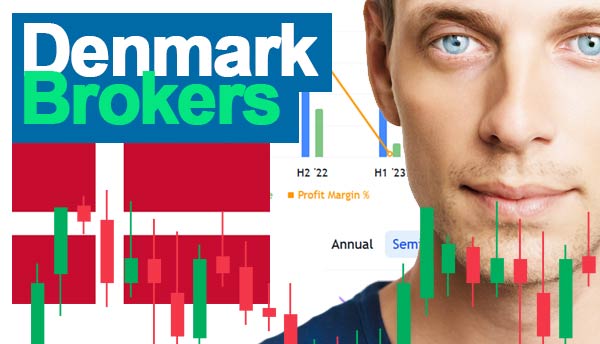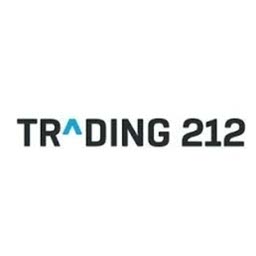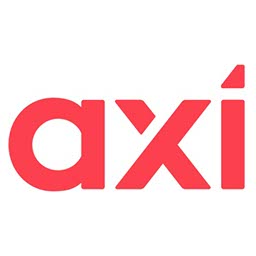Best Denmark Brokers & Trading Platforms in Denmark
Embarking on your financial journey in Denmark? Choosing the right brokers in Denmark is paramount. We delve into the intricate world of brokerage services available in Denmark, offering insights and tips from a seasoned financial writer. Discover the key factors to consider when selecting a broker in Denmark, such as regulatory compliance, fee structures, and asset diversity. We explore the Danish financial landscape, shedding light on unique market nuances. Whether you're a novice or a seasoned investor, our comprehensive guide will empower you to make informed decisions. Your financial success in Denmark begins with choosing the right broker.
Best Denmark Brokers & Trading Platforms in Denmark Table of Contents
- Denmark Brokers
- What is the role of brokers in the Danish financial market?
- How are brokers regulated in Denmark?
- What are the main types of brokerage firms operating in Denmark?
- What services do brokers in Denmark typically offer?
- How do brokerage fees and commissions work in Denmark?
- Are any specific qualifications or licenses required to become a broker in Denmark?
- How can I find a reputable broker in Denmark?
- What are the key factors to consider when choosing a broker in Denmark?
- What is the process of opening a brokerage account in Denmark?
- How are client funds protected when using a broker in Denmark?
- What are the risks associated with investing through a broker in Denmark?
- Are there any restrictions on foreign individuals or companies using Danish brokers?
- What minimum investment is required to open an account with a Danish broker?
- Can I trade international securities through a Danish broker?
- Are there any tax implications when investing through a broker in Denmark?
- How does the Danish broker market compare to other European countries?
- Do Danish brokers provide online trading platforms or tools?
- What do Danish brokers offer the customer support options?
- How do Danish brokers handle order execution and trade settlement?
- Can I transfer my existing brokerage account to a Danish broker?
- Are there any specific regulations or rules regarding margin trading in Denmark?
- What investment products are available through Danish brokers?
- Denmark Brokers Verdict
- Best Denmark Brokers & Trading Platforms in Denmark List Compared

Denmark Brokers
Danish brokers play a crucial role in facilitating investment opportunities and supporting investors in their trading endeavours in the dynamic world of financial markets. Danish brokers prioritize safeguarding investor interests and maintaining the market's integrity by providing diverse services and investment options and ensuring strict adherence to regulatory standards. This article explores Danish brokers' landscape, regulations, services, and critical considerations for investors. Whether you're a seasoned trader or a beginner, understanding the Danish broker market is essential for making informed investment decisions. Trading lives financial markets with brokers in Denmark brokers; traders are at risk of losing money rapidly. Retail CFD accounts use high-risk leverage, and Danes are at risk of financial loss.
What is the role of brokers in the Danish financial market?
In the Danish financial market, brokers are intermediaries between investors and the financial markets. Their main role is to facilitate the purchasing and selling different financial assets, for example, stocks, currencies, and other assets, on behalf of their clients. Brokers offer services that assist investors in managing their investment portfolios, executing trades, providing market analysis, and offering customer support. They provide access to trading platforms, research resources, and tools that empower investors to make informed investment decisions. Brokers play a crucial role in connecting investors with the opportunities available in the Danish financial market.
How are brokers regulated in Denmark?
Brokers operating in Denmark are regulated by the Danish Financial Supervisory Authority (DFSA). The DFSA is the primary financial regulatory body responsible for monitoring the financial markets and ensuring the integrity and stability of the Danish financial system. Brokers must comply with the regulations set forth by the DFSA, which include rules regarding licensing, capital requirements, conduct of business, and client protection. The DFSA monitors and supervises brokers to ensure they adhere to these regulations and maintain high professionalism and transparency in their operations.
What are the main types of brokerage firms operating in Denmark?
In Denmark, the major brokerage firms operating in the financial market include stock and forex traders and brokers. Stock brokers specialize in facilitating the buying and selling of stocks and other securities listed on stock exchanges. They provide access to domestic and international stock markets, enabling investors to trade a wide range of stocks. Forex trading and brokers, on the other hand, focus on facilitating foreign exchange trading, including currency pairs like USD/JPY. These brokers offer platforms for trading currencies, providing investors with the potential to profit from exchange rate fluctuations.
What services do brokers in Denmark typically offer?
Brokers in Denmark typically offer a range of services to meet the needs of investors. These services include facilitating the buying and selling financial instruments, providing access to trading platforms, offering market research and analysis, and assisting with portfolio management. Brokers also provide educational resources and tools to help investors make informed investment decisions. They may offer additional services such as investment advisory, retirement planning, and access to investment funds. The specific services offered may vary between brokers, but the common goal is to support investors in achieving their financial objectives and navigating the financial markets effectively.
25How do brokerage fees and commissions work in Denmark?
Brokerage fees and commissions in Denmark vary among brokers and depend on the services provided. Brokers typically charge fees for executing trades, managing accounts, and accessing specific services or features. These fees can be structured as a percentage of the transaction value, a flat rate per trade, or a combination of both. Some brokers may also offer commission-free trading for specific products or account types. Investors must carefully review a broker's fee structure before opening an account to ensure they understand the costs associated with trading and managing their investments.
Are any specific qualifications or licenses required to become a broker in Denmark?
Specific qualifications and licenses are required to become a broker in Denmark. Brokers must obtain the necessary support and registrations from the Danish Financial Supervisory Authority (DFSA) to operate legally in the country. These licenses ensure that brokers meet specific professional and ethical standards and can provide financial services to clients. Additionally, brokers are often required to possess relevant industry qualifications, such as finance, economics, or securities trading certifications. These qualifications and licenses demonstrate the broker's expertise and knowledge in the financial industry, instilling confidence in clients and regulatory authorities.
How can I find a reputable broker in Denmark?
Finding a reputable stock broker in Denmark can be achieved through thorough research and due diligence. Here are some steps to help you find a reputable best stock broker:
-
Research and compare: Conduct a comprehensive search for brokers in Denmark, comparing their offerings, fees, regulations, and client reviews.
-
Regulatory compliance: Ensure the broker is regulated by the Danish Financial Supervisory Authority (DFSA) and adheres to the necessary licensing requirements.
-
Reputation and track record: Look for brokers with a solid reputation, established track record, and positive client feedback.
-
Services and features: Assess the broker's range of services, trading platforms, research tools, and customer support to ensure they align with your investment needs.
-
Fees and transparency: Review the broker's fee structure and transparency in disclosing costs to avoid hidden charges or unexpected fees.
-
Security measures: Verify the broker's data security measures, encryption protocols, and client fund protection policies.
-
Seek recommendations: Seek recommendations from trusted sources, for example, financial advisors or experienced investors, who can provide insights based on their personal experiences.
By the online broker, following these steps, you can increase your chances of finding the best broker with a reputable broker in Denmark that meets your specific requirements.
What are the key factors to consider when choosing a broker in Denmark?
When choosing a broker in Denmark, several key factors should be considered:
-
Regulation: Ensure the broker is regulated by the Danish Financial Supervisory Authority (DFSA) and complies with industry regulations to protect your investments and rights as an investor.
-
Reputation: Research the broker's reputation, including their track record, customer reviews, and any regulatory actions or complaints against them.
-
Services and products: Evaluate the range of services and financial instruments the broker offers to ensure they align with your investment goals and preferences.
-
Fees and commissions: Compare the broker's fee structure, including transaction fees, account maintenance fees, and any other charges, to ensure they are competitive and transparent.
-
Trading platforms and tools: Assess the quality and functionality of the broker's trading platforms, charting tools, research resources, and other features to determine if they meet your trading goals.
-
Customer support: Consider the availability and responsiveness of customer support channels, as prompt and reliable assistance is crucial in case of any issues or inquiries.
-
Security measures: Verify the broker's security measures, such as data encryption, client fund protection, and regulatory compliance, to ensure the safety of your personal and financial information.
By carefully considering these factors, you can choose the best online broker and a broker in Denmark that best suits your trading and investment requirements.
What is the process of opening a brokerage account in Denmark?
The process of opening a brokerage account in Denmark typically involves the following steps:
-
Research and choose a broker: Identify a reputable broker in Denmark that aligns with your investment goals, trading preferences, and regulatory requirements.
-
Complete the application: Visit the broker's website and locate the account opening section. Fill out the online application form with your personal information, including your name, address, contact details, and relevant identification documents.
-
Provide identification documents: Upload or submit the necessary documents, such as a passport or ID card, to verify your identity.
-
Agree to terms and conditions: Read and understand the broker's terms and conditions, including the client agreement, risk disclosure, and other relevant documents. Agree to the terms by electronically signing or confirming your acceptance.
-
Fund your account: Once your account is approved, follow the brokers's instructions to deposit funds into your brokerage account. It can usually be done through bank transfer or other approved payment methods.
-
Explore trading platforms and features: Upon funding your account, familiarize yourself with the broker's trading platforms, tools, and features. Take advantage of any educational resources or demo accounts provided to enhance your trading skills.
-
Start trading: After completing the above steps, you can start trading. Place trades, monitor your portfolio, and stay informed about market developments to make investment decisions.
Remember, the exact process may vary slightly between brokers. Still, these general steps outline the typical procedure the best international online brokers use for opening a brokerage account in Denmark.
How are client funds protected when using a broker in Denmark?
When using a broker in Denmark, client funds are protected through several measures:
-
Segregated accounts: Brokers must keep client funds separate from their operating funds. This segregation ensures that client funds are not used for purposes other than executing client transactions.
-
Investor compensation schemes: Denmark has investor compensation schemes that provide additional protection to clients in case of a broker's insolvency. These schemes may compensate clients up to a certain amount per client in case of financial loss.
-
Regulatory oversight: Brokers in Denmark are regulated by the Danish Financial Supervisory Authority (DFSA), which sets guidelines and monitors compliance with regulations to protect client funds.
-
Financial transparency: Brokers must maintain transparency in their financial operations, including regular reporting and audits, to provide visibility into their financial health and safeguard client funds.
It's essential to choose a regulated broker and carefully review their client fund protection policies to ensure the safety of your funds when using a broker in Denmark.
What are the risks associated with investing through a broker in Denmark?
Investing through a broker in Denmark carries certain risks that investors should be aware of:
-
Market risk: All investments involve market risk, including potential losses due to market fluctuations. The value of investments can go up or down, and investors may not recoup their initial investment.
-
Regulatory risk: Changes in regulatory frameworks or policies can impact investment opportunities, trading conditions, or the protection of investor rights.
-
Counterparty risk: Investors face counterparty risk when the broker or other financial institutions involved in the investment process fail to fulfil their obligations. It's essential to choose reputable and well-regulated brokers to mitigate this risk.
-
Liquidity risk: Certain investments may need more liquidity, making buying or selling assets quickly at desired prices challenging.
-
Currency risk: Investing in foreign markets or currency pairs exposes investors to currency exchange rate fluctuations, which can impact investment returns.
-
Operational risk: There is a risk of technical issues, system failures, or other operational disruptions that may affect trade execution, access to funds, or account management.
To mitigate these risks, investors must diversify their portfolios, conduct thorough research, trade stocks, stay informed about market developments, and seek professional advice when necessary.
Are there any restrictions on foreign individuals or companies using Danish brokers?
There are typically no restrictions on foreign individuals or companies using Danish stock brokers in Denmark itself. Danish brokers generally provide services to domestic and international clients, allowing foreign investors to access the Danish financial markets. However, foreign individuals and companies must comply with regulatory requirements, such as providing necessary identification documents and adhering to anti-money laundering regulations. Additionally, foreign investors should consider any tax implications or reporting obligations in their home country when investing through Danish brokers.
What minimum investment is required to open an account with a Danish broker?
The typical minimum investment required to open an account with a Danish broker can differ depending on the broker and the type of account. However, many brokers offer accounts with low minimum deposit requirements, ranging from around 100 to 1,000 euros. Some brokers even provide the option to open accounts without any initial deposit, allowing investors to fund their accounts later. It's important to note that certain account types or investment products from the best online brokers may have higher minimum investment requirements. Investors should review the broker's details to determine the minimum investment amount for their preferred account type.
Can I trade international securities through a Danish broker?
Yes, you can trade international securities through a Danish broker. Many Danish brokers provide access to a wide range of international securities, including stocks, bonds, exchange-traded funds (ETFs), and other financial instruments listed on major global exchanges. These brokers offer trading apps, platforms and tools that enable investors to trade international securities conveniently. By trading apps and using a Danish broker, investors can diversify their trading portfolios and benefit from the investment opportunities in global markets.
Are there any tax implications when investing through a broker in Denmark?
There are tax implications when investing through a broker in Denmark. Investors should be aware of the following:
-
Capital gains tax: Profits from the sale of investments, such as stocks or other financial instruments, may be subject to capital gains tax. The tax rate depends on the duration of holding the investment and the specific tax regulations in Denmark.
-
Dividend tax: Dividends received from investments may be subject to dividend tax. The tax rate and regulations regarding dividend taxation may differ depending on factors such as residency and the country of origin of the dividend.
-
Withholding tax: Investments in specific foreign securities may be subject to withholding tax imposed by the country where the securities are listed. The rates and regulations of withholding tax differ between countries.
Investors must consult with a tax advisor or familiarize themselves with the relevant tax laws and regulations to understand their tax obligations when investing through a broker in Denmark.
How does the Danish broker market compare to other European countries?
Like other European countries, the Danish broker market offers investors a competitive and well-regulated environment. Compared to other European countries, the Danish broker market is characterized by its high regulatory standards, transparency, and investor protection measures. The Danish Financial Supervisory Authority (DFSA) ensures that brokers adhere to strict regulations, instilling confidence in the market. Danish brokers provide access to various financial instruments, competitive trading platforms, and reliable customer support. While each European country has unique features, the Danish broker market stands out for its emphasis on regulatory compliance and investor security.
Do Danish brokers provide online trading platforms or tools?
Yes, Danish brokers offer a variety of online and online trading platforms and tools for trading. These platforms are designed to provide investors with user-friendly interfaces, real-time market data, advanced charting tools, and order execution capabilities. Online and mobile trading platforms offered by Danish brokers enable investors to access multiple financial markets, trade various instruments, and manage their portfolios efficiently. Some brokers may also provide additional tools such as risk management features, trading signals, and educational resources to support investors in making informed trading decisions. When trading through Danish brokers, investors can choose the platform that meets their needs and preferences.
What do Danish brokers offer the customer support options?
Danish brokers typically provide various customer support options to assist investors. These may include:
-
Phone support: Brokers offer phone support, allowing investors to speak directly with customer service representatives to address their inquiries or resolve any issues.
-
Email support: Investors can email brokers to ask questions, seek assistance, or submit documents.
-
Live chat: Some brokers offer live chat support on their websites, enabling investors to have real-time conversations with support staff.
-
FAQ and knowledge base: Brokers often provide comprehensive FAQ sections or knowledge bases on their websites, offering self-help resources to address common queries.
-
Online ticketing system: Investors can submit support tickets through an online system detailing their concerns or requests for assistance.
-
Social media: Some brokers maintain active social media accounts, which investors can use to ask questions or seek support.
How do Danish brokers handle order execution and trade settlement?
Danish brokers prioritize efficient order execution and trade settlement processes to ensure smooth and timely investor transactions. When investors place orders through Danish brokers, the brokers utilize advanced trading technology and infrastructure to execute those orders on the relevant exchanges or liquidity providers. Brokers strive to provide competitive order execution speeds, high risk, and minimal slippage to enhance trading outcomes for their clients.
Regarding trade settlement, Danish brokers follow industry-standard practices. After the trade execution, brokers facilitate the settlement process, which involves transferring the securities from retail investor accounts to the investor's account and ensuring the corresponding funds are exchanged. Brokers work closely with custodian banks and clearinghouses to ensure accurate and secure settlement of trades in adherence to regulatory requirements and market conventions.
Can I transfer my existing brokerage account to a Danish broker?
It is possible to transfer an existing brokerage account to a Danish broker. Many Danish brokers offer a seamless and straightforward process for transferring accounts from other brokers. Investors interested in transferring their accounts must complete a transfer request with the Danish broker, providing the necessary information about their existing accounts. The Danish broker will then coordinate with the investor's current broker to facilitate the transfer of assets, positions, and account information. It is advisable to contact the Danish broker directly for specific instructions and requirements regarding the account transfer process.
Are there any specific regulations or rules regarding margin trading in Denmark?
Yes, there are specific regulations and rules regarding margin trading in Denmark. Margin trading involves trading with borrowed funds, allowing investors to amplify their stock trading positions potentially. However, it also carries additional risks. In Denmark, margin trading is subject to regulations by the Danish Financial Supervisory Authority (DFSA). These regulations ensure investor protection and minimize the potential for excessive risk-taking.
Danish brokers offering margin trading services must adhere to strict capital adequacy requirements, risk management practices, and disclosure obligations to financial regulators. They must assess the suitability of margin trading for individual investors and provide clear information about the risks involved. The regulations aim to safeguard investors and promote responsible trading practices in the margin trading space.
What investment products are available through Danish brokers?
Danish brokers offer a wide range of investment assets to cater to the diverse needs of investors. These investment products may include:
-
Stocks: Danish brokers provide access to domestic and international stock markets, allowing investors to trade shares of individual companies.
-
Bonds: Investors can trade various types of bonds, for example, government bonds, corporate bonds, and municipal bonds, through Danish brokers.
-
Exchange-Traded Funds (ETFs): Danish brokers provide a variety of ETFs and investment funds that are listed on stock exchanges and seek to replicate the efficiency of specific market indices or sectors.
-
Forex (Foreign Exchange): Danish brokers provide the opportunity to trade major currency pairs and other currency pairs in the forex market.
-
Derivatives: Danish brokers may offer derivatives such as options and futures, which enable investors to venture into the price fluctuations of underlying assets.
-
Commodities: Some Danish brokers provide access to commodities trading, including precious metals, energy, agricultural products, and more.
The specific range of investment products offered by Danish brokers may vary. Investors should review the product offerings of individual brokers to determine which investment options align with their investment goals and risk tolerance.
Denmark Brokers Verdict
As the Danish financial market continues to evolve, Danish brokers remain at the forefront of providing reliable and efficient trading services. With robust regulation, various investment products, and innovative trading platforms, they cater to the needs of multiple investors. Danish brokers offer opportunities with low trading fees and proper safeguards if you're interested in stock trading, forex trading, or exploring other financial instruments. By considering the factors in this article and conducting thorough research, investors can confidently navigate the Danish broker market and make informed choices to pursue their investment goals.
Best Denmark Brokers & Trading Platforms in Denmark List Compared
| Featured Denmark Broker Trading Platform | Account Features | Trading Features |
|---|---|---|
| Used By: 180,000 Instruments Available: 232 Stocks Available: 2100 US Stocks: Yes UK Stocks: Yes German Stocks: Yes Japanese Stocks: Yes Indices: Yes Forex Pairs Available: 61 Major Forex Pairs: Yes Minor Forex Pairs: Yes Exotic Forex Pairs: Yes Minimum Deposit: 200 |
Platforms: MT4, MT5, Mirror Trader, ZuluTrade, Web Trader, cTrader, Mac Negative Balance Protection: Inactivity Fee: No Losses can exceed depositsVisit |
|
| Used By: 10,000 Instruments Available: 100 Stocks Available: 53 US Stocks: Yes UK Stocks: Yes German Stocks: Yes Japanese Stocks: Yes Indices: Yes Forex Pairs Available: 35 Major Forex Pairs: Yes Minor Forex Pairs: Yes Exotic Forex Pairs: Yes Minimum Deposit: 10 USD / 10 EUR |
Platforms: MT4, MT5, Mac, Web Trader, cTrader, Tablet & Mobile apps Negative Balance Protection: Inactivity Fee: No Losses can exceed depositsVisit |
|
| Used By: 200,000 Instruments Available: 1000 Stocks Available: 99 US Stocks: Yes UK Stocks: Yes German Stocks: Yes Japanese Stocks: Yes Indices: Yes Forex Pairs Available: 80 Major Forex Pairs: Yes Minor Forex Pairs: Yes Exotic Forex Pairs: Yes Minimum Deposit: 100 |
Platforms: Web Trader, MT4, MT5, AvaTradeGo, AvaOptions, Mac, Mobile Apps, ZuluTrade, DupliTrade, MQL5 Negative Balance Protection: Inactivity Fee: No 71% of retail CFD accounts lose moneyVisit |
|
| Used By: 10,000 Instruments Available: 100 Stocks Available: 10000 US Stocks: Yes UK Stocks: Yes German Stocks: Yes Japanese Stocks: Yes Indices: Yes Forex Pairs Available: 60 Major Forex Pairs: Yes Minor Forex Pairs: Yes Exotic Forex Pairs: Yes Minimum Deposit: 100 |
Platforms: MT4, MT5, IRESS, Mac, Web Trader, Tablet & Mobile apps Negative Balance Protection: Inactivity Fee: No Losses can exceed depositsVisit |
|
| Used By: 250,000 Instruments Available: 4000 Stocks Available: 1696 US Stocks: Yes UK Stocks: Yes German Stocks: Yes Japanese Stocks: Yes Indices: Yes Forex Pairs Available: 57 Major Forex Pairs: Yes Minor Forex Pairs: Yes Exotic Forex Pairs: Yes Minimum Deposit: 0 |
Platforms: MT4, Mirror Trader, Web Trader, Tablet & Mobile apps Negative Balance Protection: Inactivity Fee: Yes 76% - 83% of retail investor accounts lose money when trading CFDs with this provider. You should consider whether you understand how CFDs work and whether you can afford to take the high risk of losing your money. Visit |
|
| Used By: 89,000 Instruments Available: 100 Stocks Available: 60 US Stocks: No UK Stocks: No German Stocks: Yes Japanese Stocks: No Indices: Yes Forex Pairs Available: 70 Major Forex Pairs: Yes Minor Forex Pairs: Yes Exotic Forex Pairs: Yes Minimum Deposit: 200 |
Platforms: MT4, MT5, Mac, ZuluTrade, Web Trader, cTrader, Tablet & Mobile apps Negative Balance Protection: Inactivity Fee: Yes CFDs are complex instruments and come with a high risk of losing money rapidly due to leverage. Between 74-89 % of retail investor accounts lose money when trading CFDs. You should consider whether you understand how CFDs work and whether you can afford to take the high risk of losing your moneyVisit |
|
| Used By: 10,000,000 Instruments Available: 1000 Stocks Available: 160 US Stocks: Yes UK Stocks: Yes German Stocks: Yes Japanese Stocks: Yes Indices: Yes Forex Pairs Available: 55 Major Forex Pairs: Yes Minor Forex Pairs: Yes Exotic Forex Pairs: Yes Minimum Deposit: 5 |
Platforms: MT4, MT5, Mac, Web Trader, Tablet & Mobile apps Negative Balance Protection: Inactivity Fee: Yes CFDs are complex instruments and come with a high risk of losing money rapidly due to leverage. 77.74% of retail investor accounts lose money when trading CFDs with this provider. You should consider whether you understand how CFDs work and whether you can afford to take the high risk of losing your money.Visit |
|
| Used By: 20,000,000 Instruments Available: 2000 Stocks Available: 2042 US Stocks: Yes UK Stocks: Yes German Stocks: Yes Japanese Stocks: Yes Indices: Yes Forex Pairs Available: 50 Major Forex Pairs: Yes Minor Forex Pairs: Yes Exotic Forex Pairs: Yes Minimum Deposit: 50 |
Platforms: Web Trader, Tablet & Mobile apps Negative Balance Protection: Inactivity Fee: Yes 51% of retail investor accounts lose money when trading CFDs with this provider.Visit |
|
| Used By: 15,000,000 Instruments Available: 10000 Stocks Available: 1731 US Stocks: Yes UK Stocks: Yes German Stocks: Yes Japanese Stocks: Yes Indices: Yes Forex Pairs Available: 177 Major Forex Pairs: Yes Minor Forex Pairs: Yes Exotic Forex Pairs: Yes Minimum Deposit: 1 |
Platforms: Web Trader, Tablet & Mobile apps Negative Balance Protection: Inactivity Fee: No CFDs are complex instruments and come with a high risk of losing money rapidly due to leverage. 76% of retail investor accounts lose money when trading CFDs with this provider. You should consider whether you understand how CFDs work and whether you can afford to take the high risk of losing your money.Visit |
|
| Used By: 10,000 Instruments Available: 15000 Stocks Available: 1000 US Stocks: Yes UK Stocks: Yes German Stocks: Yes Japanese Stocks: Yes Indices: Yes Forex Pairs Available: 55 Major Forex Pairs: Yes Minor Forex Pairs: Yes Exotic Forex Pairs: Yes Minimum Deposit: 1 |
Platforms: Web Trader, Tablet & Mobile apps Negative Balance Protection: Inactivity Fee: No Losses can exceed depositsVisit |
|
| Used By: 10,000 Instruments Available: 100 Stocks Available: 10 US Stocks: Yes UK Stocks: No German Stocks: No Japanese Stocks: No Indices: Yes Forex Pairs Available: 40 Major Forex Pairs: Yes Minor Forex Pairs: Yes Exotic Forex Pairs: Yes Minimum Deposit: 100 |
Platforms: MT4, MT5, Tablet & Mobile apps Negative Balance Protection: Inactivity Fee: Yes Losses can exceed depositsVisit |
|
| Used By: 300,000 Instruments Available: 100 Stocks Available: 0 US Stocks: Yes UK Stocks: Yes German Stocks: Yes Japanese Stocks: Yes Indices: Yes Forex Pairs Available: 150 Major Forex Pairs: Yes Minor Forex Pairs: Yes Exotic Forex Pairs: Yes Minimum Deposit: 1000 |
Platforms: MT4, MT5, ZuluTrade, Web Trader, Tablet & Mobile apps Negative Balance Protection: Inactivity Fee: No Losses can exceed depositsVisit |
|
| Used By: 10,000 Instruments Available: 100 Stocks Available: 1000 US Stocks: Yes UK Stocks: Yes German Stocks: Yes Japanese Stocks: Yes Indices: No Forex Pairs Available: 100 Major Forex Pairs: Yes Minor Forex Pairs: Yes Exotic Forex Pairs: Yes Minimum Deposit: 0 |
Platforms: MT4, Mac, ZuluTrade, Web Trader, Tablet & Mobile apps Negative Balance Protection: Inactivity Fee: No Losses can exceed depositsVisit |
|
| Used By: 4,000,000 Instruments Available: 2200 Stocks Available: 2000 US Stocks: Yes UK Stocks: Yes German Stocks: Yes Japanese Stocks: No Indices: Yes Forex Pairs Available: 67 Major Forex Pairs: Yes Minor Forex Pairs: Yes Exotic Forex Pairs: Yes Minimum Deposit: 100 |
Platforms: MT4, MT5, Web Trader, Tablet & Mobile apps Negative Balance Protection: Inactivity Fee: Yes 67% of retail investor accounts lose money when trading CFDs with this provider. You should consider whether you can afford to take the high risk of losing your moneyVisit |
|
| Used By: 10,000 Instruments Available: 100 Stocks Available: 0 US Stocks: No UK Stocks: No German Stocks: Yes Japanese Stocks: Yes Indices: Yes Forex Pairs Available: 45 Major Forex Pairs: Yes Minor Forex Pairs: Yes Exotic Forex Pairs: Yes Minimum Deposit: 100 |
Platforms: MT4, MT5, Tablet & Mobile apps Negative Balance Protection: Inactivity Fee: No Losses can exceed depositsVisit |
Best Denmark Broker Denmark Broker Reviews
Read our details broker Denmark Broker Denmark Broker reviews, you will find something useful if you are shortlisting a Denmark Broker Denmark Broker and trading platform.
- IC Markets Review (read our in depth reviews)
- Roboforex Review (read our in depth reviews)
- AvaTrade Review (read our in depth reviews)
- FP Markets Review (read our in depth reviews)
- XTB Review (read our in depth reviews)
- Pepperstone Review (read our in depth reviews)
- XM Review (read our in depth reviews)
- eToro Review (read our in depth reviews)
- Trading 212 Review (read our in depth reviews)
- SpreadEx Review (read our in depth reviews)
- HYCM Review (read our in depth reviews)
- Swissquote Review (read our in depth reviews)
- Axi Review (read our in depth reviews)
- Markets.com Review (read our in depth reviews)
- Eightcap Review (read our in depth reviews)
Denmark Broker Denmark Broker Alternatives
Read about and compare Denmark Broker Denmark Broker alternatives. We have indepth side by side comparisons to help you find Denmark Broker Denmark Broker related brokers.
- IC Markets Alternatives
- Roboforex Alternatives
- AvaTrade Alternatives
- FP Markets Alternatives
- XTB Alternatives
- Pepperstone Alternatives
- XM Alternatives
- eToro Alternatives
- Trading 212 Alternatives
- SpreadEx Alternatives
- HYCM Alternatives
- Swissquote Alternatives
- Axi Alternatives
- Markets.com Alternatives
- Eightcap Alternatives

 IC Markets
IC Markets
 Roboforex
Roboforex
 AvaTrade
AvaTrade
 FP Markets
FP Markets
 XTB
XTB
 Pepperstone
Pepperstone
 XM
XM
 eToro
eToro
 Trading 212
Trading 212
 SpreadEx
SpreadEx
 HYCM
HYCM
 Swissquote
Swissquote
 Axi
Axi
 Markets.com
Markets.com
 Eightcap
Eightcap
